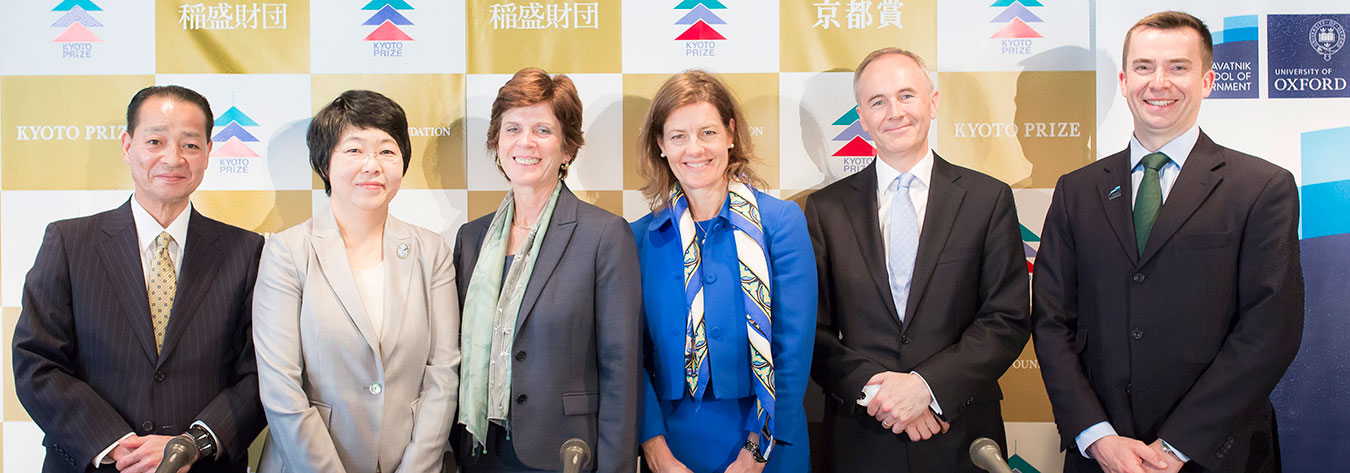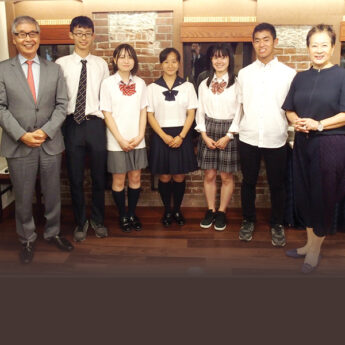- Winners to be involved in lectures, seminars, discussions
- Prize designed to share Dr Kazuo Inamori’s philosophy
- Celebrates talent applied for business, life, the public good
Beginning in 2017, the University of Oxford will host a series of lectures, interactive seminars and panel discussions involving winners of the prestigious Kyoto Prize, Japan’s highest private award for global achievement.
The new tie-up between the university and the Inamori Foundation, which presents the annual prizes, was announced in Tokyo on 9 May. The initial event will take place at the Blavatnik School of Government, the university’s newest department, over two days in May 2017.
“The ties between the University of Oxford and Japan stretch back almost 400 years, and it is a privilege to add a new chapter to this history of collaboration”, said Professor Louise Richardson, vice-chancellor of the university, as she announced the agreement at a press conference in Tokyo.
“The Kyoto Prize laureates have contributed significantly to the scientific, cultural and spiritual betterment of mankind, and we are honoured to have the opportunity to bring them to our university to amplify public appreciation of this award in the United Kingdom and Europe”.
The Kyoto Prize at Oxford is designed to provide opportunities for students and faculty across the university to learn more about the philosophy of Dr Kazuo Inamori, president of the foundation, and the values of the Kyoto Prize, she added.
First awarded in 1985, the Kyoto Prize is presented to people who have made advances in the areas of advanced technology, basic sciences or arts and philosophy.
The 2016 winners, announced in June, are roboticist Dr Takeo Kanade, medical scientist Dr Tasuku Honjo, and philosopher Dr Martha Craven Nussbaum. Each of the winners received a diploma, a gold medal and prize money of ¥50mn.
Inamori was unable to attend the announcement event but, in a statement, said that over the past 30 years, the Kyoto Prize has been implemented based on the principle that, “people have no higher calling than to strive for the greater good of humankind and society”.
Another guiding principle, according to Inamori, is that the future of humanity can be assured only when there is a balance between scientific development and the enrichment of the human spirit.
Famous in Japan for founding Kyocera Corporation and building it into one of the world’s foremost electronics and ceramics manufacturers, he delivered a lecture at Oxford in 2014 in which he shared his philosophy of success and fulfilment simultaneously in both business and life.
Richardson said that all who heard the lecture were impressed by his insistence that executives do everything in their power to support their employees.
“This is a truly exceptional partnership—inspiring, educating and connecting individuals who strive for the greater good of humankind, and society is at the very heart of what both the Blavatnik School of Government and the Inamori Foundation do every day”, said Professor Ngaire Woods, dean of the school, which today has students and researchers from 80 countries.
“It is this sense of shared purpose that inspires our partnership”, she added. “We are honoured to offer a home for the Kyoto Prize at Oxford and an annual event to celebrate talent applied to public good”.
British Ambassador to Japan Tim Hitchens CMG LVO said he welcomed the strengthening of links between the foundation and the university, its first Japanese-language book having been received by the Bodleian Library in 1629. The university is currently home to around 100 Japanese undergraduate and graduate students.
“The Kyoto Prize is indeed a very important award and, if we look at previous winners, we soon realise their range and calibre”, he said, adding that many have subsequently gone on to win Nobel Prizes.
UK winners include Dame Jane Goodall DBE, a renowned anthropologist; John Maynard Smith, a theoretical evolutionary biologist and geneticist; Sir Karl Popper CH, a philosopher; and Sir Tony Hoare, a pioneering computer scientist.
Alison Beale, director of the University of Oxford Japan Office and member of the British Chamber of Commerce in Japan Executive Committee, underlined the importance of the new event in further deepening ties.
“We have had an office here for 25 years and our links with Japan have always been excellent”, she told BCCJ ACUMEN. “This new initiative is an example of how Japan plays a central role in the university’s international ambitions, and demonstrates the depth and vitality of Oxford’s relationship with Japan”.







